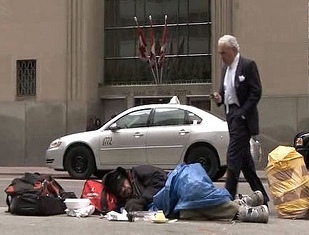“Where is the political outrage?” asks University of Regina professor John Conway at the start of Bert Deveaux’s excellent new documentary, Poor No More, which takes us on an enlightening, infuriating tour through Canada’s new rust belt. Here, the permanent poverty, lost industrial jobs and food banks are reaching proportions not seen since the Great Depression.
“What happened to the social safety net that the generations after the Second World War had fought for so that Canadians would never again experience the deprivations of the 1930s?” asks Mary Walsh, comedian, actor and moderator for the documentary.
Many things we once took for granted — unemployment insurance, universal health care, pensions, and full time union-protected jobs — are being eroded. In their place has arisen a new reality where increasing numbers of people find themselves in insecure and low paying part-time and casual jobs, with few or no benefits.
Still a “work in progress” that won’t be officially released until the New Year, Poor No More will be sneak-previewed at this week’s Canadian Labour International Film Festival. It plays this Saturday (Nov. 28) in Toronto, and at various times on the Nov. 28 to 29 weekend in locations across Canada.
Despite the seriousness of the subject matter, Poor No More is a breezy, highly understandable rendering of an important topic, energized by the presence of the straight-shooting, feisty Walsh (best known for her work on This Hour Has 22 Minutes) and the workers who tell their own stories. At the heart of this film are real people, not policy wonks.
Poor No More does not revisit the discussions, for instance, that took place among the political decision makers and the business think tanks in the 1970s that prepared the way for the implementation of the neo-liberal agenda of tax cuts, slashing of universal social programs, workfare, privatization and public/private partnerships.
Instead, we meet the people whose lives have been affected by those seismic policy shifts. We are introduced to Durval, a unionized construction worker, who watches with concern as temp agencies entice customers to go for non-union labour at rates of $10 to $15, rather than the standard union rate of $28 to $30 an hour which he is tenuously holding onto.
We also meet Vicki, who has worked for more than a decade at the government-owned Liquor Control Board of Ontario, where 60 per cent of employees are defined as casual and thus unable to access to sick benefits. Vicki ended up taking time off without pay twice — first to look after her daughter who had to go for a kidney transplant, and several years later when she herself was diagnosed with breast cancer. During the second episode, Vicki became more dependent on her relatives, especially her parents, to make ends meet.
Then, there is Brenda, who spent 13 years at a grocery store which had her work for less than 40 hours a week so that it could avoid its benefit obligations under provincial labour and employment law. Now, the single mother finds herself heading deeper into debt while subsisting on unemployment insurance and looking for another job. “It wrecks you emotionally,” she tells the camera.
Fa Lim was one of 2,400 workers at a Canadian plant left without a job one day when the company suddenly closed its doors. A quickly marshaled picket line in front of the facility to protest the unannounced, stealth closure of the plant was legally scuttled when the former employer successfully approached a judge, at his home, for an injunction against the protest.
Finally, there is a couple — nameless in the documentary — who decide to wing it and eat less rather than go through the indignity of welfare. If you’re lucky enough to get past the administrative hurdles, you’ve got to face rude case workers and have your personal financial assets stripped before becoming eligible to receive payments intended to ensure only your minimum survival.
But does it have to be like this? Evidently not. Mary Walsh takes Vicki and Duval on a little trip to Ireland and Sweden to see how other countries deal with economic dislocation. The trio discover that other nations take a fundamentally more enlightened approach to their citizens’ well-being.
Not that those policies haven’t come under fire — especially in the wake of the global financial meltdown. Ireland, for example, has lost its allure as the Celtic Tiger following last fall’s economic downturn. The previous temporary boom was the result of lower corporate tax rates and the nation’s new membership in the European Union. With fewer skilled jobs around, the major source of employment in Ireland today lies in the traditionally lower paying retail sector. Meanwhile, Irish employers are demanding a reduction of the minimum wage and the elimination of legal requirements involving sick pay.
But it is not all dire, reports Mary Walsh. Young people in Ireland still have access to a free university education and the unions which are consulted regularly by the Dublin government appear stronger, united and more self confident then their counterparts in Canada.
The kicker — as revealed in the trip to Sweden — is that the social safety net which includes universal child care and income and training supports for the unemployed owes its continued vitality to the existence of a powerful labour movement with seats on corporate boards to represent employee interests, and also to the country’s tradition of voting social democratic parties into power.
The underlying, takeaway lesson from this film is that unions need to blow their horns about their value to the society. Doing that, perhaps, would be a powerful first step towards restoring Canada’s once-prized social safety net.
Visit Labour Films and click on “festival locations” for local venues and times.
Paul Weinberg is a Toronto writer.



